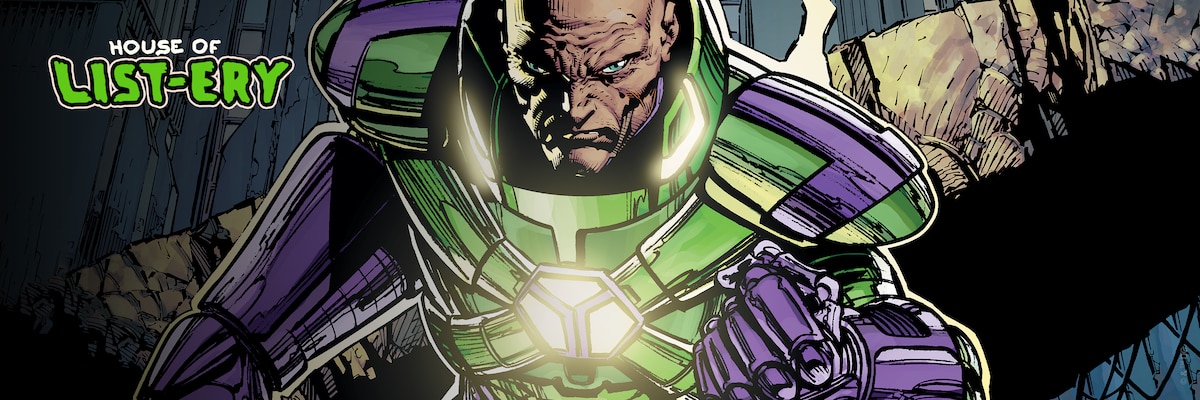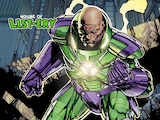At the very top of DC’s long list of supervillains sits the maniacal billionaire super genius, Lex Luthor. Created in 1940, Luthor has stood the test of time not just as Superman’s longest running archenemy, but unquestionably his greatest. Representing everything Superman is not through his dark deeds and utter vanity, there have been battles of wills between the two for almost a century. But what exactly exemplifies Luthor’s evil? Is it simply because he’s rich enough to finance weapons in Metropolis? Is it how he corrupts the courts to continually escape justice? Oh…it’s all that and so much more! For just a taste of Luthor’s evil, let’s look at five examples demonstrating that when it comes to the baddest bad guys, Luthor ranks as the very worst of them all.
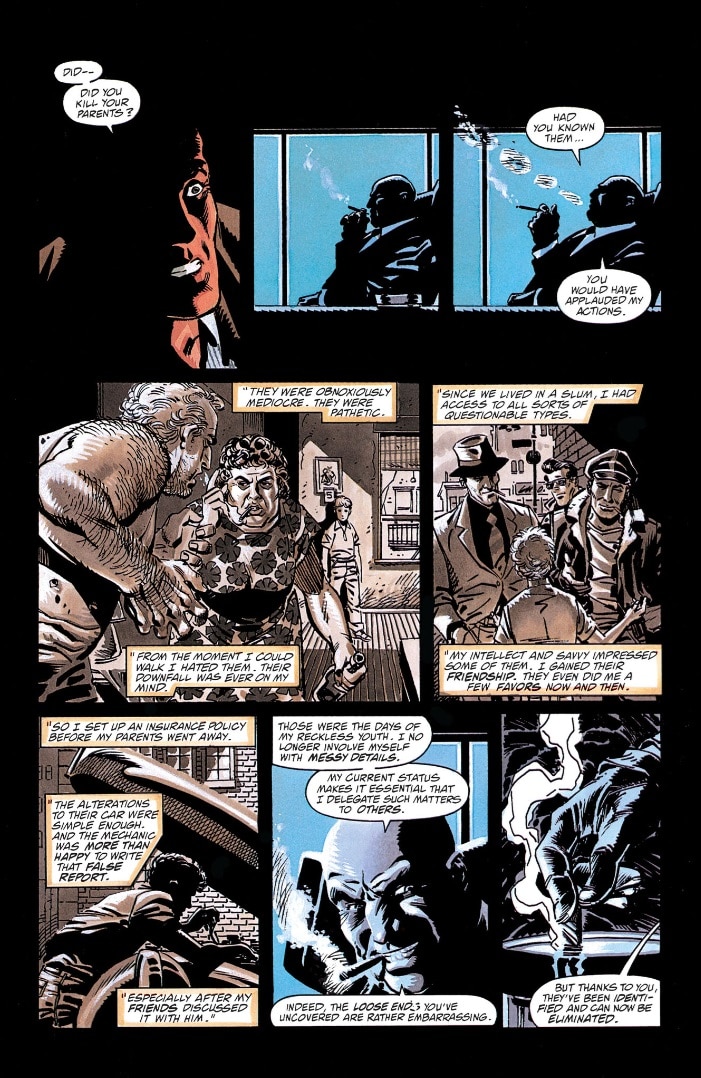

He Killed His Parents for Starters
With Lex Luthor, you can’t help but wonder if his evil is a result of nature or nurture. Was he raised to be a diabolical madman, or was that quality in him from the very beginning?
Several different iterations of the bald billionaire have commented on this, most famously on Smallville, which suggested that Lex was led down a dark path in no small part by the Machiavellian intentions of his evil father Lionel. That story ends similarly to Lex Luthor: The Unauthorized Biography, in which reporter Peter Sands does some digging into the Metropolis Mogul’s backstory, unearthing some very disturbing truths. Among these was Sands’ discovery that Luthor, when he was a child, orchestrated the deaths of his parents. Their demise led to him inheriting a large sum of money, which he used to begin his business career. But Luthor himself reveals that he long yearned to do in his mother and father for being “obnoxiously mediocre.” They were doomed for a long time, seemingly serving the purpose of being an early notch on Luthor’s long list of victims.
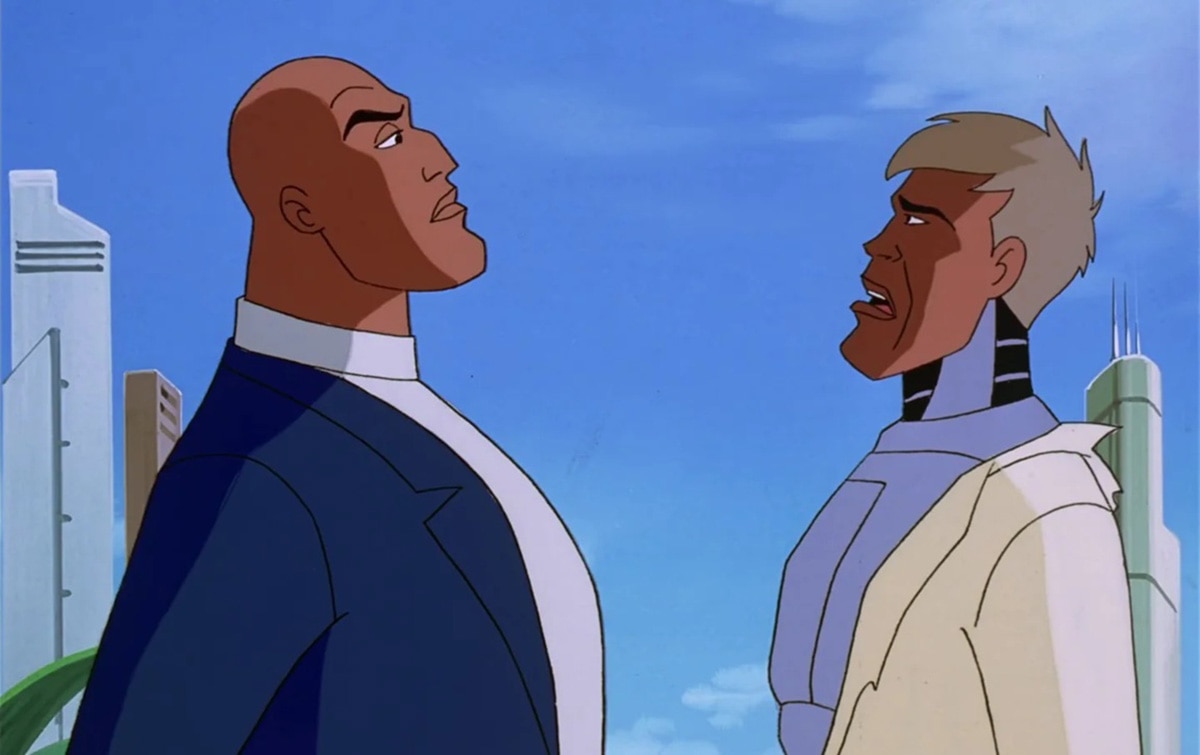

In Creating Metallo, He Destroyed Several Lives Just to Get at Superman
This example from an early episode of Superman: The Animated Series focuses on the creation of the classic Superman enemy, Metallo. The exact schemes, however, are shockingly evil, especially for a show aimed at young viewers!
John Corben is a deadly mercenary who’s sprung from prison and given a special operation in order to save his life from an uncurable disease. The whole thing is engineered by Luthor as a way of thanking him for keeping quiet on Luthor’s involvement in a previous criminal deal. He replaces Corben’s skeleton with a new metallic alloy that makes him impervious to pain and injury, granting him nearly infinite strength. Unfortunately, this also robs him of his senses, and he can no longer taste, touch or smell, which enrages Corben.
Later we learn that Luthor paid Corben’s prison doctor to poison him with the disease, giving Luthor a way to feign appreciation for his loyalty. While Metallo was rampaging across town and battling Superman, Luthor then had the doctor murdered to erase any evidence which could lead back to him. All this destruction, solely for the purpose of killing Superman.
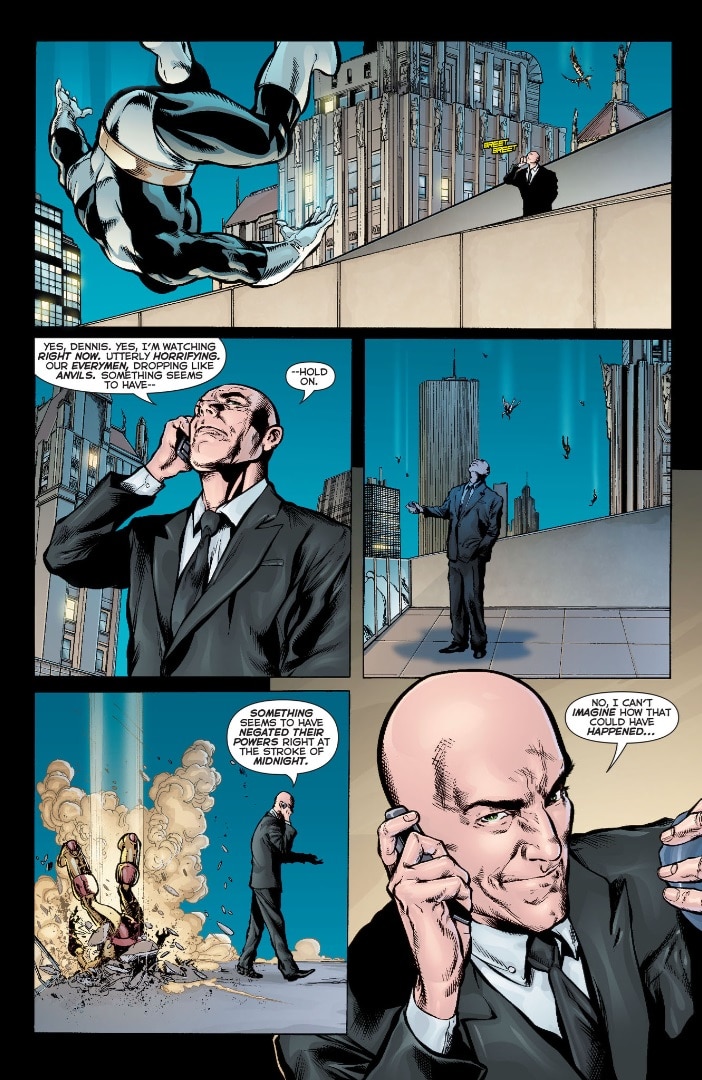

The Infamous “Rain” of the Supermen
In the weekly series 52, Superman and other heroes go missing in action, giving Lex Luthor the perfect opportunity to take full control, reinvigorating his public image while engaging in enterprises both financial and criminal. He launches the Everyman Project, an operation which imbues several ordinary citizens with superpowers via a metagene enhancing surgery. With these new heroes, he forms a super team taking on the name Infinity Inc., giving the people of Metropolis hope they haven’t felt since Superman’s disappearance.
Unfortunately, those who giveth can just as easily taketh away. On New Year’s Eve, Luthor revokes the powers in his dozens of Everymen heroes, many of whom had just taken flight. Suddenly, the skies are littered with men and women violently falling to their deaths.
The reasons for Luthor’s mass murder were multifold, from keeping the focus in Metropolis on his heroes and away from others, as well as ensuring he’s the only true beneficiary of the technology behind the Everyman Project. Regardless, this example underlines the sinister pattern with Luthor’s evil. His plans must always be a means towards further ends, and innocents will always needlessly suffer for his desires.
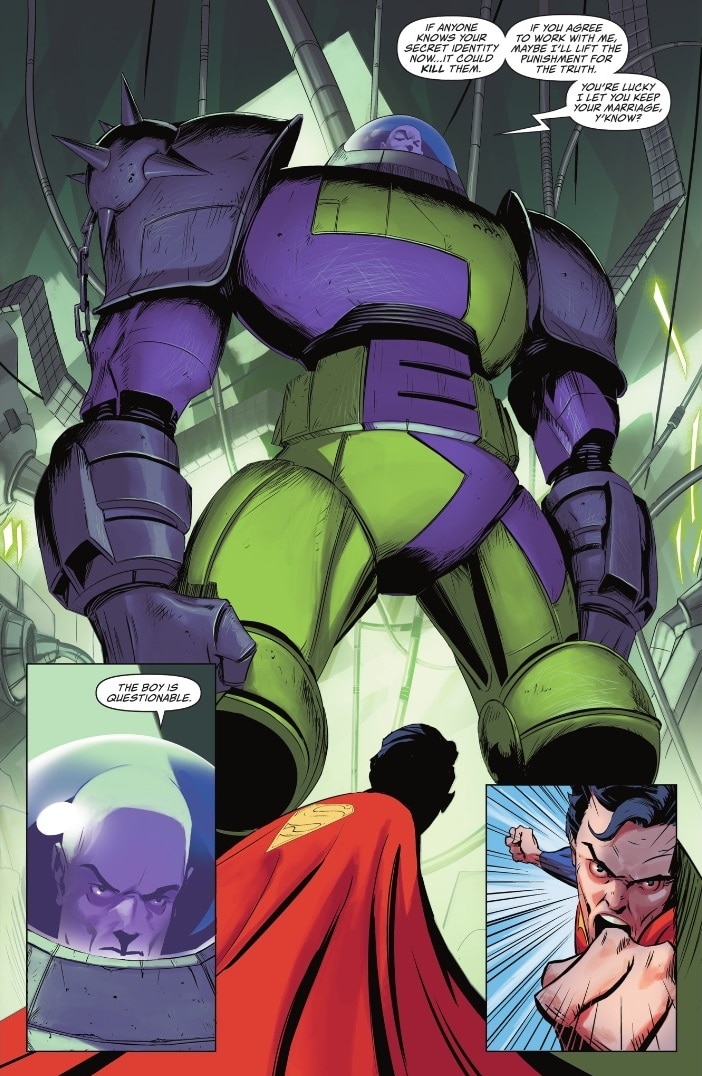

If Anyone Learns of Superman’s Identity, They Will Die
Superman’s life has undergone a series of major changes in recent years. From the birth and accelerated aging of his son Jon to his decision to reveal to the world his identity as Clark Kent, the Man of Steel has weathered these life changes with characteristic aplomb. Unfortunately, his greatest enemy could only tolerate so much before he forced things to get back to a status quo of his choosing.
Upon visiting the Kent home, Perry White suddenly suffers a stroke when confronted with the fact that Clark Kent is Superman, something told to him by his ace reporter months earlier. After a lifesaving race to the hospital, Lois and Clark are baffled why the knowledge of his dual identities nearly killed their employer. They find out soon enough as Luthor reveals that—with the tortured assistance from the telepathic Manchester Black and the weaponization of Warworld technology—he engineered a mental attack which affects everyone worldwide.
With the exception of the Justice League, Titans and Superman’s family (thanks to mental defenses set up by the Martian Manhunter), if anyone comes close to learning the truth about Superman’s secret identity, they’ll die. Luthor believes that Superman’s image as a godlike being is not only useful for the survival of the human race, but his own ego as well. Superman must not be seen as human to the people he protects. That’s how Luthor prefers to view him, and thanks to him, that’s the way it’s going to be.
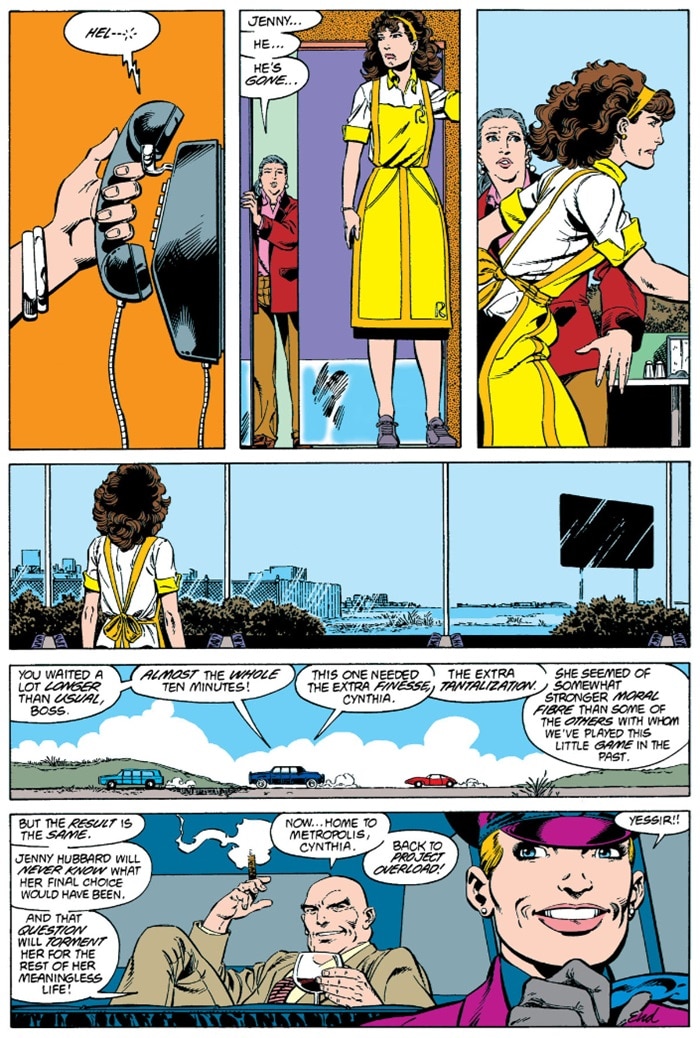

900 Miles to Ruin a Life
In 1987’s Superman #9, Luthor drops by a diner located 900 miles away from Metropolis for a meal and asks if he could be served by a young waitress named Jenny Hubbard. As her co-workers watch in amazement at the famous billionaire conversing with a small-town server, the conversation between the two concludes in a stunning proposition. Luthor asks Jenny to leave her husband and job for one month, live with him in Metropolis, and in return he’ll pay her a million dollars.
Jenny at first is appalled by the offer, offended that someone from the upper class would demean her in such a way. But Luthor calmly responds by telling her entire life’s story in the span of a few seconds. Between a high school romance and a dead-end job, he forces her to confront her own unfulfilled dreams, dangling a chance at success for the cost of one month’s stay. Luthor leaves for his car, giving Jenny ten minutes to change her mind and accept his offer. After talking to her coworkers and attempting to call her husband, Jenny’s informed that Luthor has left before the ten minutes were up. In the car, we see Luthor and his chauffeur laughing and revealing that this is a game he plays often with random people whenever he pleases.
What makes this so galling is the needless cruelty of it all. Luthor doesn’t know Jenny and believed he would never see her again. It also gives truth to Luthor’s lie that he opposes Superman because of the threat he represents to everyday humans like us. Through his cruel and manipulative actions here, Luthor reveals that he holds humans in just as much contempt as he does superhumans.
Cackling as he returns to the city he always aims to control, it’s moments like this that make us thankful we have Superman to regularly knock this guy on his butt, as he’s done consistently for over eighty-five years.
Superman, directed by James Gunn and starring David Corenswet, Rachel Brosnahan and Nicholas Hoult, is now in theaters! Click here to get tickets.
Donovan Morgan Grant writes about comics, graphic novels and superhero history for DC.com. Follow him on Bluesky at @donomark and X at @donoDMG1.
NOTE: The views and opinions expressed in this feature are solely those of Donovan Morgan Grant and do not necessarily reflect those of DC or Warner Bros. Discovery, nor should they be read as confirmation or denial of future DC plans.
